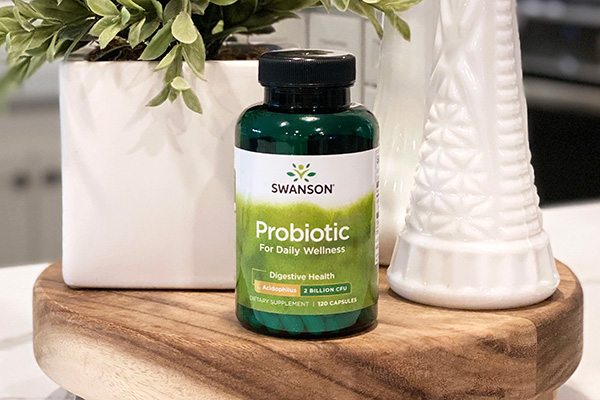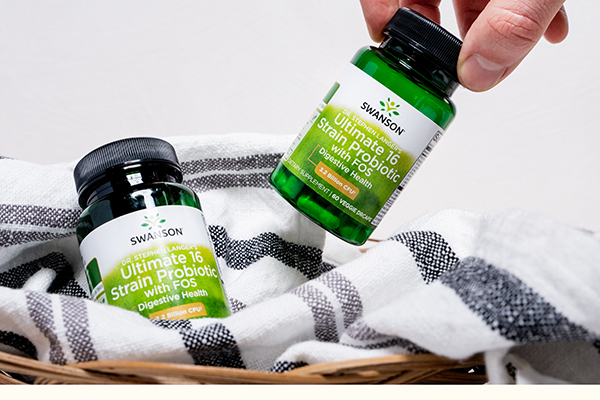The 4 Steps to Choosing a Probiotic
Choosing a probiotic may seem a little overwhelming. Probiotics are everywhere, and as researchers uncover more about them, they grow even more popular. Options are great to have, but that can also make deciding on a good probiotic more confusing.
We’re here to help you understand probiotics, what they do, and how to choose a probiotic supplement that's right for you.
What Are Probiotics?
When it comes to understanding the difference between prebiotics vs. probiotics vs. postbiotics, the similar names can seem a bit confusing. Probiotics are “friendly” bacteria and yeasts that line your digestive tract. Probiotics is actually an umbrella term for all the different beneficial bacteria, but each strain or type of bacteria offers unique benefits.1
As a whole, probiotics offer vital support for your health. Most people tend to think of bacteria negatively, but probiotics are the opposite. Our bodies have a symbiotic relationship with these microorganisms, meaning they work together to survive.
Good bacteria produce enzymes that help balance your digestive system and support your body’s ability to absorb nutrients. Collectively, this community of microorganisms is referred to as your “gut flora.”
Why Should I Take Probiotics?
Probiotics promote immune health, digestive health, brain health, emotional wellness and more. The most frequently touted benefits of probiotics are related to digestive and gut health, and gastrointestinal support, but other studies have focused on the benefits of probiotics for the immune system.2,3
Since these microorganisms are already in your gut, you're probably wondering why you need to take more of them. That’s because it's important to maintain a healthy balance of good bacteria in your system. Everything from stress to the foods we eat and chemicals in our water can upset the natural balance of our digestive system. Taking probiotic supplements regularly may help your system balance and stay that way.
Things to Consider When Choosing a Probiotic
Everyone’s system is unique, and the same probiotics may not be right for every person, but here are a few things you should know before choosing a probiotic supplement:
- Understanding Colony Forming Units (CFU)
Probiotics are measured in CFU, or colony forming units. This is an estimate of the number of viable (live) bacterial cells. When looking for a probiotic supplement, you will find CFUs ranging anywhere from one billion to 100 billion. But more doesn’t always mean better. - Learning About Probiotic Strains
There are thousands of probiotic strains on the market. Most of them fit into two primary categories: Lactobacilli and Bifidobacteria. Each probiotic strain offers specific benefits. For example, if you're having trouble with digestive issues, you might consider L. fermentum, or L. brevis. If you're concerned about colon health, the probiotic B. breve may be a good choice. While you're searching for a probiotic supplement, do some research and choose strains that are best for your particular health concerns. - Probiotic Strain Count
Many probiotic supplements contain more than one strain in a single supplement, but as with CFUs, more isn’t always better. The probiotics in combined supplements should all work together toward a similar goal, like our Swanson Probiotic for Digestive Health, which contains carefully selected probiotic strains that work together to help your digestive system. For more specific goals, we also carry both a men's and women's probiotic with doctor trusted strains for digestive health.† - Reading Probiotic Labels
As with any nutrition label, reading the labels on probiotics may seem a little daunting at first, but it’s important to read them closely because you need to understand what’s in the supplements you take. You also need to know how often to take it and how to store it properly. Not to mention there may be specialized ingredients like cranberry for urinary tract health or saw palmetto for prostate health, which depending on your gender, may be more beneficial.
The Supplement Facts listed on probiotics typically include the serving size, a list of the probiotics included in the supplement and the total CFUs of those probiotics. Most labels will also include information about the health concerns for which it was formulated.
Take a look at the label on your probiotics and if you don't recognize the probiotic strains in the bottle, do a little research to see what each probiotic strain helps, and find out if there are any scientific studies backing the benefits.
How to Store Your Probiotics
As for storage, one of the top probiotic myths is that all probiotics need to be refrigerated. Some probiotics do require refrigeration, but technology advancements have made that less common than it used to be. Your probiotic packaging will include storage instructions if it needs to be refrigerated.
Also, take note if there’s an expiration date. Probiotics are live microorganisms, and not all of them have an endless shelf life. If your bottle doesn’t list an expiration date, choose the freshest bottle possible.

About Lindsey Toth, MS, RD
Lindsey is a nationally recognized registered dietitian and nutritionist with a soft spot for ice cream. She empowers people to take charge of their health by finding the balance between the pleasure and nourishment in food.Her philosophy is that you should take care of your body because it’s the only permanent home you have. It’s what inspired her to pursue a career in nutrition.
*These statements have not been evaluated by the Food and Drug Administration. These products are not intended to diagnose, treat, cure, or prevent any disease.
†Disclaier: Based on a 2024 ProClaim Solutions survey of Primary Care Physicians, L. acidophilus NCFM is trusted to support digestive health based on review of clinical studies. www.howaru.com
Sources
1. Probiotics. WebMD. Read source
2. Ritchie ML, Romanuk TN. PLoS One. 2012;7(4):e34938. Read source
3. Yan, F., & Polk, D. B. (2011). Current opinion in gastroenterology, 27(6), 496–501. Read source




